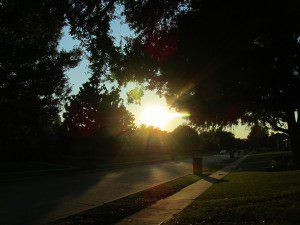
I woke up Sunday morning to a Facebook post requesting help in explaining the First Source of Unitarian Universalism to kids:
Direct experience of that transcending mystery and wonder, affirmed in all cultures, which moves us to a renewal of the spirit and an openness to the forces which create and uphold life
Despite the rather vague way it describes religious experience, it is relevant that the leaders of the early combined denomination, who were thoroughly grounded in Humanism, placed first-hand religious experience ahead of the words and deeds of prophets, the wisdom of the world’s religions, and the teachings of Judaism, Christianity, and Humanism (the Sixth Source “Spiritual teachings of earth-centered traditions” was added in 1995). Those who are planning the future of Unitarian Universalism would do well to remember this.
From Facebook I looked at some of the comments on last week’s blog post Dispassionately Dissecting Religion. The seemingly-inevitable arguments from anti-theists praised the myth of Progress and lumped all religion together with the worst of superstition and oppression, but they almost completely ignored the main theme of the post: the importance of first-hand experience in understanding the origins and impact of religion.
There is a great lack of understanding of religious experience in our contemporary Western society. This is not particularly surprising. Religious experiences are messy, they’re subjective, and they don’t play by the rules of orthodoxy – they’re hard for religious leaders to control.
For at least the past 500 years, Christianity has been dominated by a very intellectual approach to religion. For Protestants, this has been sola scriptura – the primacy of the Bible. Catholics have done a better job of holding on to first-hand experience, but they’re still dominated by doctrines, canon laws, and Papal encyclicals. Even Evangelicals, who emphasize “conversion experiences” and a “personal relationship with Jesus” are clear that such experiences must occur within approved boundaries and must be interpreted in approved ways. Those that vary even a bit from orthodoxy are suspected of being a “counterfeit of the devil.”
 Meanwhile, we have a never-ending supply of materialist killjoys who are happy to tell us that the sun is nothing more than a ball of burning hydrogen gas and that magical feeling you get when you stand under the full moon is just a product of your brain chemistry. (Of course it’s that – but it’s also a lot more than that.)
Meanwhile, we have a never-ending supply of materialist killjoys who are happy to tell us that the sun is nothing more than a ball of burning hydrogen gas and that magical feeling you get when you stand under the full moon is just a product of your brain chemistry. (Of course it’s that – but it’s also a lot more than that.)
The Stanford Encyclopedia of Philosophy has a nice article on religious experience. It’s long and not particularly easy to read, but it does a decent job of explaining what learned men (if they included any women I missed them, and their omission is not unimportant) have said about the matter. I can personally recommend one of their references: Varieties of Religious Experience by William James (1902). It has a lot of Christian assumptions and examples, but I prefer that to the overwhelmingly non-theistic assumptions of most later works.
I have a hard time defining religious experience (or spiritual experience, if you prefer). But I can describe it. At its most basic level, it’s that feeling you get when you come across something so big, so powerful, and so strange that all you can do is stare at it and say “wow”… but deep down you know it’s not all that strange – you’re connected to it in some way. It’s seeing the ocean for the first time. It’s seeing a deer or a bear or an eagle in the wild. It’s leaving the city and looking up at truly dark skies and seeing more stars than you thought existed. It’s realizing the light from some of those stars has been traveling through space for millions of years and is just now reaching the Earth.
It’s realizing the universe is so big and you’re so small, but you’re still a part of it all, a part of a Whole that is greater than any of us. It’s the feeling that these connections mean something more than the fact that they happen, and wondering what that something is.
We have – or can have – these experiences all the time. We don’t appreciate them as religious experiences – and sometimes we don’t even recognize them as anything at all – because we’re too busy to stop long enough to allow ourselves to go from seeing the sunset to experiencing the sunset, much less to wondering about the sunset. And if we allow ourselves to wonder too much, we might start wondering about the direction of our lives, our goals, and our priorities. We might start thinking that meaning and happiness don’t come from bigger houses, more expensive cars, and the envy of our neighbors. And we can’t have that, now can we? Our whole economy would collapse if everybody started valuing religious experiences over buying stuff.

But it is in the recognition and acceptance of these ordinary religious and spiritual experiences that we train our perceptive abilities for deeper, more powerful, and more meaningful experiences. Which, of course, is one of the reasons people tune it out. If you think comparing your less than a century on this Earth with dinosaur tracks that are 110 million years old is scary, try having a primal Forest God tap you on the shoulder and tell you there are things He wants you to do for Him.
These deeper and more intense religious experience are even harder to describe than the more ordinary ones, in large part because our society has no common understanding of them. We’re taught that people who hear voices are crazy, and that people who do what the voices tell them to do are dangerous… even though we celebrate the heroism of Joan of Arc and wonder about the prophecies of Nostradamus. That was a long time ago when things were different… or something… anything to distance ourselves from the unpredictability of an encounter with a God or other mighty spirit.
It is rare to hear audible voices or to see extraordinary things with your physical eyes. More frequently it’s a voice in your head that isn’t your usual self-talk voice, especially if it tells you something you didn’t know or didn’t really want to hear. It’s seeing something ordinary and being left with the unshakable understanding that it means something more. It’s a dream that’s more than the routine sorting and filing of the day’s events.
It’s divination that tells you something you know is important even though you wish it wasn’t. It’s a reading where the diviner repeats exactly what you heard and saw in a waking vision even though they had no way of knowing you had it.
Major or minor, ordinary or extraordinary, religious experiences are real. This is why I get so annoyed when social scientists ignore religious experiences in their theories of the origins and meaning of religion. It’s like trying to explain the popularity of basketball using only socio-economic theories, having never set foot on a court and experienced the feeling of hitting a 15 foot jump shot and hearing the swish of nothing but net.
Religious experiences are undeniably real. The question is how we interpret them – how we decide what they mean.
Some people consciously choose to not interpret their experiences. “I saw the sunset, it was beautiful, and I was happy.” That approach doesn’t set any expectations for future experiences that may not happen, or that may not be as beautiful or make you as happy. Nobody can tell you you’re wrong, and it doesn’t carry any obligations to change the way you live. You had the experience, you noticed it, you’ll remember it, and life goes on. It’s a perfectly legitimate approach.
Some people choose to demystify their experiences. “The sun appeared to set because of the rotation of the Earth, and the interaction of the light with the atmospheric conditions at the time created colors that evoked tranquility and caused my brain to produce pleasurable chemicals.” There’s a place for science and I like knowing the facts. But our world is too dreary as it is, and if a beautiful sunset will help re-enchant it, I prefer to embrace the magic.
 Other people choose to interpret their experiences religiously. They see how their experiences align with their ideas about the nature of the world and the way the universe works, and they decide (often intuitively) what their experiences mean and what they should do because of them. “The setting sun reminds me that my life is finite, but as a restful night leads to a new morning, so will my death lead to a new life, even though I can’t know if that life will be physical, or spiritual, or something I can’t even imagine right now.”
Other people choose to interpret their experiences religiously. They see how their experiences align with their ideas about the nature of the world and the way the universe works, and they decide (often intuitively) what their experiences mean and what they should do because of them. “The setting sun reminds me that my life is finite, but as a restful night leads to a new morning, so will my death lead to a new life, even though I can’t know if that life will be physical, or spiritual, or something I can’t even imagine right now.”
Of course, not all religious experiences are so pleasant. Many of us have received messages along the theme of “there’s a storm coming – gather your tribe.” We’ve been told to make offerings and go on pilgrimages. Some have been told to build temples, orders, and priesthoods. And a lot of us have been told to get ready, even though we aren’t quite sure what we’re getting ready for.
Religious experiences can change your life, sometimes dramatically. Joan of Arc was burned at the stake at age 19.
There’s a lot of ground to cover between opening yourself to the wonder and awe of a sunset or the full moon and doing something that can get you literally or figuratively burned at the stake. I could tell you that you can turn back at any time, but it would be a lie. Religious experiences are meaningful – they bring a sense of purpose and they cause you to adjust your priorities toward values and virtues our mainstream world thinks are unimportant. Adjusting your priorities opens you to further experiences, which bring more meaning to your life and reinforce your ideas that these values and virtues are more valuable than chasing what the talking heads on TV tell you to buy.
Eventually you realize you can’t go back to the way you were before, because you see the world differently… and because you don’t want to go back to the way you were before.
So go outside this evening and watch the sun set. Find the waxing crescent moon in the western sky and watch it grow brighter as the sun’s light fades. See the stars as they start to twinkle and shine. If it’s overcast, just watch as the sky slowly moves from light to dark. You’re an educated person – you know the science of what you’re seeing. Tonight, though, just let the sky speak to you.
It may say nothing. It may say nothing for a month or two or ten, and then suddenly overwhelm you when you don’t expect anything at all. That’s the thing about religious experiences – they come in their own time and not according to our preferences and schedules.
Or it may say something that will change your life forever.


















